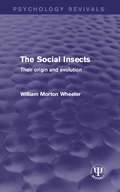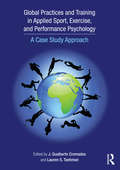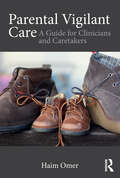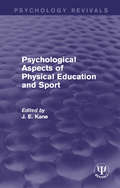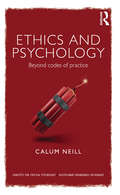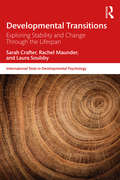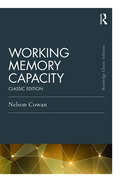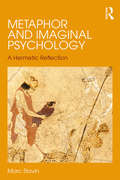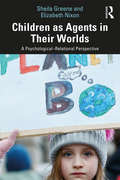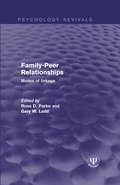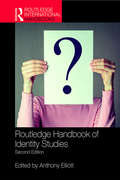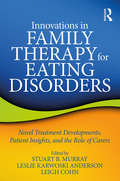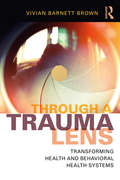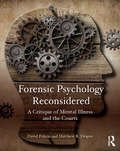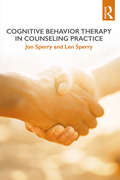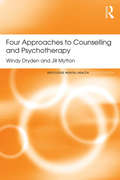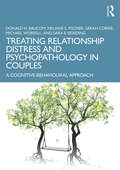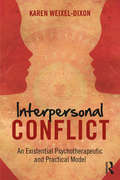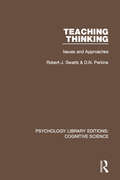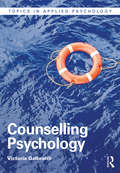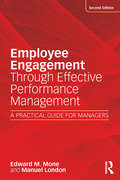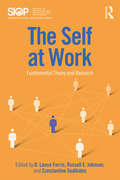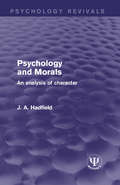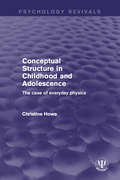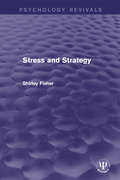- Table View
- List View
The Social Insects: Their Origin and Evolution (Psychology Revivals)
by William Morton WheelerOriginally published in 1928, this volume, by a world authority on the subject, sums up our knowledge of the social insects. It inquires what are the social insects and what it is that makes us call them ‘social’. Terebrantia, aculeata, wasps, bees, ants, and termites are discussed in a succession of chapters, showing how they have evolved, to how great an extent they have developed, and what are the peculiarities of their evolution. Polymorphism, the Social Medium, Guests and Parasites of the Social Insects, are other subjects discussed in this fascinating book.
Global Practices and Training in Applied Sport, Exercise, and Performance Psychology: A Case Study Approach
by J. Gualberto Cremades Lauren S. TashmanGlobal Practices and Training in Applied Sport, Exercise, and Performance Psychology offers case analysis as a vehicle to address issues and experiences in the application of sport, exercise, and performance psychology (SEPP) and the supervision/training of individuals to become professionals in the field. A follow-up to Becoming a Sport, Exercise, and Performance Psychology Professional (2014), this book features a discussion of real-world case examples which highlight various aspects of professional practice as well as supervision and training. Professionals from around the world, including the United States and Canada, Europe, Asia, Africa, and Australia share diverse experiences, providing a uniquely in-depth, global perspective. The case studies contained in the book were selected to provide insight into specific elements of applied practice and supervision/training through a global lens as well as demonstrate the value of incorporating case analysis and reflection into one’s training and continued professional development. Case analysis is an essential part of learning and instruction. Beyond educating the reader about theories and research on related topics in the field, case analysis allows for more complex levels of learning, including analysis, synthesis, and evaluation of diverse scenarios. In Part I of this book, the cases focus on applied SEPP practice; Part II is comprised of cases that focus on training and supervision. This book is essential reading for graduate students and neophyte professionals in the field for whom it is critical to learn how to effectively apply knowledge to real-world sport, exercise, and performance psychology scenarios. In addition, the book is a useful resource for seasoned and expert practitioners and supervisors who can use case analysis as a means of continuing their professional development.
Parental Vigilant Care: A Guide for Clinicians and Caretakers
by Haim OmerThis volume presents the concept of vigilant care as a protective and non-intrusive parental attitude to risky behaviors of children and adolescents. The effective component in vigilant care is not control, but parental presence. Vigilant care is a flexible attitude in which parents shift between levels of open attention, focused attention, and protective action, according to the alarm signals they detect. The author presents a detailed theoretical, empirical, and clinical rationale for the model that deals with potentially problematic parental attitudes or parent-child processes such as overparenting, psychological control, disregard of legitimate personal domains or of the child's need for self-determination, parent-child mutual distancing, and escalation.
Psychological Aspects of Physical Education and Sport (Psychology Revivals)
by J. E. KanePsychology has an important part to play in the teaching and practice of physical education and sport, and this volume, originally published in 1972, provided a systematic and authoritative introduction to the major areas in this field at the time. The contributors, leading experts in the UK and US, cover five major areas of psychology: perception, learning, personality, motivation and emotion, focusing attention on important current research of the time, and opening up these areas for the serious student. They review controversial issues of central importance in physical education and sport, pointing to practical implications for learning, teaching and coaching. A great opportunity to read an early take on what has become a central part of physical education and sport today.
Ethics and Psychology: Beyond Codes of Practice (Concepts for Critical Psychology)
by Calum NeillThis highly original book explores the idea and potential of psychology in the context of ethical theory, and the idea of ethics in the context of psychology. In so doing, it not only interrogates how we come to understand ethics and notions of right behaviour, but also questions the discipline of psychology and how it functions in the 21st century. Neill turns psychology inside out, controversially suggesting that psychology no longer exists as we know it. He proposes a rebirth of psychology based on an intricate and detailed examination of who we really are, and how we come to structure this idea of ourselves. Taking the idea of ethics seriously, Neill allows us to see psychology in a totally new light, addressing key points, such as: The inadequacy of psychology to address the question of ethics throughout history. Why thinking through the question of ethics necessarily brings us into confrontation with a question of psychology. What we actually do when we do psychology and how, via a serious consideration of ethics we might do this differently and better. Ethics and Psychology presents readers with a new and potentially productive understanding of both ethics and psychology and will appeal to anyone active within and critically engaged with the field.
Developmental Transitions: Exploring stability and change through the lifespan (International Texts in Developmental Psychology)
by Sarah Crafter Rachel Maunder Laura SoulsbyHow can we make sense of change and stability through the lifespan of human development? What role does personal experience, our relationships with others, and historical and sociocultural contexts play in shaping these changes? This is the first book to offer an integrative overview of the range of developmental transitions which occur through the lifespan. Bringing together different theoretical and conceptual perspectives and a broad range of empirical research including quantitative and qualitative approaches, this book encompasses a range of complex transitional forms. Covering topics such as health transitions, transitions in friendships and romantic relationships, career transitions, and societal transitions, this book takes the reader beyond a focus on childhood and adolescence, to look at the whole lifespan. Reflecting a perspective that takes into account a sociocultural past and present, this book seeks to show how transitions can be viewed as both an experience of uncertainty and possibility. Transitions perform important functions and present psychosocial opportunities. Developmental Transitions is essential reading for all undergraduate and graduate students of developmental and cultural psychology and is also a valuable resource for academics and practitioner audiences interested in stability and change as people age.
Working Memory Capacity: Classic Edition (Psychology Press & Routledge Classic Editions)
by Nelson CowanThe idea of one's memory "filling up" is a humorous misconception of how memory in general is thought to work; it actually has no capacity limit. However, the idea of a "full brain" makes more sense with reference to working memory, which is the limited amount of information a person can hold temporarily in an especially accessible form for use in the completion of almost any challenging cognitive task. This groundbreaking book explains the evidence supporting Cowan's theoretical proposal about working memory capacity, and compares it to competing perspectives. Cognitive psychologists profoundly disagree on how working memory is limited: whether by the number of units that can be retained (and, if so, what kind of units and how many), the types of interfering material, the time that has elapsed, some combination of these mechanisms, or none of them. The book assesses these hypotheses and examines explanations of why capacity limits occur, including vivid biological, cognitive, and evolutionary accounts. The book concludes with a discussion of the practical importance of capacity limits in daily life. This 10th anniversary Classic Edition will continue to be accessible to a wide range of readers and serve as an invaluable reference for all memory researchers.
Metaphor and Imaginal Psychology: A Hermetic Reflection
by Marc SlavinMetaphor and Imaginal Psychology: A Hermetic Reflection provides the first full-length exploration of the significance of metaphor in post-Jungian psychology. Its portrayal of the mythological figure of Hermes as a personification of metaphor marks an original contribution to the field of metaphor studies. After a 2,500-year exile from philosophy and related areas of study, beginning with Plato’s ejection of the poets from the ideal city-state, metaphor is today experiencing a season of renewal. Among the fields where its significance as a way of seeing, thinking, and feeling has been especially prominent is archetypal psychology, perhaps the most philosophically attuned of psychological disciplines. Approaching the work of James Hillman and other key archetypal psychologists from a poststructuralist perspective, Metaphor and Imaginal Psychology draws insightful comparisons between archetypal psychology and the deconstructive philosophy of Jacques Derrida, a principle theorist of metaphor’s philosophical resurgence. By linking two disciplines that might at first appear as strange bedfellows, Metaphor and Imaginal Psychology underscores the influence of metaphor in reason and emotion, and makes a compelling case for the Mercurial ethos of our postmodern world. Aside from representing essential reading for therapists and theorists working in post-Jungian studies, the book will appeal to readers, students and scholars of literary criticism, psychology, philosophy and mythology.
Children as Agents in Their Worlds: A Psychological–Relational Perspective
by Sheila Greene Elizabeth NixonAre children the passive recipients of influence from their parents and from society? Is their development determined by their genes and their neurons, or do they have the capacity to think about and influence their own lives and the world around them? How does their interaction with their social and material worlds support or hinder agency? Are children agents, and what do we mean by agency? Children as Agents in Their Worlds aims to answer these questions through a critical psychological and relational approach, while referencing and critiquing a wide range of perspectives from other disciplines including sociology, anthropology and education. Greene and Nixon review the pioneering work of scholars of childhood studies and current post-human theories of agency and offer a developmental perspective on the emergence of the sense of agency and the exercise of agency in children. They discuss key themes including agency in families, agency within the school context and with peers, and children as agents in the wider public sphere. They explore agency and diversity, examining sex, age, genetic inheritance and contextual sources of difference, such as social class and geographical location. Offering a stronger theoretical base for research and policy, through a synthesis of both psychological and relational theories, Children as Agents in Their Worlds will be essential reading for students and professionals in developmental psychology, sociology and anthropology, as well as education, childhood studies, children’s rights and related fields.
Family-Peer Relationships: Modes of Linkage (Psychology Revivals)
by Ross D. Parke Gary W. LaddOriginally published in 1992, this volume provided an up-to-date overview of recent research concerning the links between family and peer systems. Considerable work in the past had focused on family issues or peer relationships, but these systems had typically been considered separately. This volume bridges the gap across these two important socialization contexts and provides insights into the processes that account for the links across the systems – the ways in which the relationships between these systems shift across development. In addition, the variations in the links between family and peers are illustrated by cross-cultural work, studies of abused children, and research on the impact of maternal depression. In short, the volume provides not only a convenient overview of recent progress at the time but lays out an agenda for future research.
Routledge Handbook of Identity Studies: 2nd edition (Routledge International Handbooks)
by Anthony ElliottIn this comprehensive, accessible handbook, acclaimed social theorist Anthony Elliott brings together internationally distinguished and emergent scholars in the social sciences and humanities to review the major theoretical traditions, trends and trajectories in the hugely popular field of identity studies. The Routledge Handbook of Identity Studies set new standards for reference works when first published, such was the far-reaching sweep of topics discussed – including identity studies reconfigured by feminism, post-structuralism and postmodernism, individualization theories, media and cultural studies, race and ethnicity, consumerism, environmentalism, post-colonialism, globalization and many more. This second edition of the handbook contains new contributions, including an updated general introduction from Anthony Elliott on the fast-changing conditions and contours of identity transformations in the global age. There are also new chapters on the emergence of posthuman identities - with specific focus on the global consequences of biotechnology, biomedicine, robotics and artificial intelligence for the analysis of identity - and on identity mobilities. The handbook's clear and accessible format will appeal to a wide undergraduate audience, as well as researchers and teachers, in the social sciences and humanities.
Innovations in Family Therapy for Eating Disorders: Novel Treatment Developments, Patient Insights, and the Role of Carers
by Stuart Murray Leigh Cohn Leslie AndersonInnovations in Family Therapy for Eating Disorders brings together the voices of the most-esteemed, international experts to present conceptual advances, preliminary data, and patient perspectives on family-based treatments for eating disorders. This innovative volume is based partly on a special issue of Eating Disorders: The Journal of Treatment and Prevention and includes a section on the needs of carers and couples, "Tales from the Trenches," and qualitative studies of patient, parent, and carer experiences. Cutting edge and practical, this compendium will appeal to clinicians and researchers involved in the treatment of eating disorders.
Through a Trauma Lens: Transforming Health and Behavioral Health Systems
by Vivian Barnett BrownThrough a Trauma Lens aims to understand and highlight successful examples of health, mental health, substance abuse treatment, and other service delivery systems that have implemented an integrated trauma-informed service model. This innovative volume draws on the author’s first-hand experience working alongside a number of local and state organizations as well as a nationwide survey of notable trauma-informed models. Structured around illustrative case studies, chapters that correspond to stage of adoption, and strategies for cultivating staff support, this valuable new resource include examples and strategies to be applied in any treatment or service setting.
Forensic Psychology Reconsidered: A Critique of Mental Illness and the Courts
by David Polizzi Matthew R. DraperForensic psychology is where psychology meets the criminal justice system. An understanding of the intersection of criminal law and psychological issues relating to criminal responsibility is critical for criminal justice students. This accessible text focuses on the criminal law implications of forensic psychology as it relates to topics such as competency to stand trial, state of mind at the time of the crime, suicide by cop, and involuntary psychiatric medication administered in custody. Unlike more traditional texts on this topic, which are primarily concerned with the clinical practice of forensic psychology, this book focuses on critical thinking as it relates to these topics. Each chapter presents a critical analysis of the topic under study, going beyond merely identifying the legal parameters of criminal responsibility to explore the ethical, philosophical, and theoretical foundations of that concept.
Cognitive Behavior Therapy in Counseling Practice
by Len Sperry Jon SperryThis Cognitive Behavior Therapy text is brief, practical, comprehensive, and tailored just for counselors. Evidence-based CBT techniques are specifically adapted to counseling including core-counseling concepts such as social justice, strengths, wellness, and diversity (e.g., ethnicity, culture, sexual orientation, gender, disability) which are interwoven throughout the book’s content. Each chapter includes case vignettes that reflect the work of professional counselors in school, clinical mental health, marital and family, and rehabilitation settings.
Four Approaches to Counselling and Psychotherapy (Routledge Mental Health Classic Editions)
by Windy Dryden Jill MyttonFour Approaches to Counselling and Psychotherapy provides an essential introduction to and overview of the main models of psychotherapy and counselling. With a new preface from Windy Dryden, this Classic Edition traces the development of counselling and psychotherapy, and examines the relationship between the two. The authors consider the four main models - psychodynamic, humanistic, integrative and cognitive-behavioural - before focusing on the most popular approach for each, including person-centred, rational emotive behavioural, and multimodal. Each approach is clearly examined in terms of its historical context and development, its main theoretical concepts and its aims. Written clearly and concisely, the book will have international appeal as an ideal introductory text for all those embarking on psychotherapy and counselling courses. It will also prove invaluable to students requiring a clear introduction to the subject.
Treating Relationship Distress and Psychopathology in Couples: A Cognitive-Behavioural Approach
by Sarah Corrie Michael Worrell Donald H. Baucom Melanie S. Fischer Sara E. BoedingClose relationships and mental health are two key ingredients to living a meaningful, fulfilled life. These two domains are the central focus of Treating Relationship Distress and Psychopathology in Couples: A Cognitive-Behavioural Approach. As expert clinicians, trainers, and researchers in the field of cognitive-behavioural couple therapy and couple-based interventions for psychopathology, the authors offer a highly accessible volume for experienced clinicians and trainees alike. This book details the most recent innovations in CBCT, a principle-based, flexible treatment approach for couples with a wide range of relationship concerns, circumstances, and stages of life. Based on a clear conceptual framework, readers learn how to address individual and couple functioning in an integrated, comprehensive manner and how to apply principle-based interventions that directly flow from this framework. Treating Relationship Distress and Psychopathology in Couples was written by a team of five authors, born in four different countries and working together as a team for a number of years, providing a cohesive framework based on work in a variety of contexts. While staying close to research findings that inform treatment, they provide a text for clinicians at all levels of training and experience in working with couples.
Interpersonal Conflict: An Existential Psychotherapeutic and Practical Model
by Karen Weixel DixonInterpersonal Conflict provides a psychotherapeutic and philosophical understanding of the nature of interpersonal conflict. Arguing that facilitating conflict resolution has little to do with objective logic or rationale, and everything to do with personal (and cultural) values and aspirations, Karen Weixel-Dixon uses the lens of existential psychotherapy to provide innovative skills for conflict management. The book offers a deeper understanding of those theories and practices surrounding currently held perspectives on conflict, and extends the repertoire of communication skills relevant to difficult interpersonal situations, offering theoretical and practical input into the possibilities of reaching a therapeutic result. Interpersonal Conflict will be an engaging and informative guide for professionals in psychotherapy, health, HR, legal and teaching professions working with conflict, as well as students taking courses involving conflict resolution.
Teaching Thinking: Issues and Approaches (Psychology Library Editions: Cognitive Science)
by Robert J. Swartz D.N. PerkinsOriginally published in 1990, this title attempts to provide for the educational practitioner an overview of a field that responded in the 1980s to a major educational agenda. This innovative ‘agenda’ called for teaching students in ways that dramatically improved the quality of their thinking. Its context is a variety of changes in education that brought the explicit teaching of thinking to the consciousness of more and more teachers and administrators.
Counselling Psychology (Topics in Applied Psychology)
by Victoria GalbraithThis is the first textbook to provide a complete overview of counselling psychology. Covering not only the underlying principles and philosophy of the profession, it offers a uniquely applied perspective in a concise, student-friendly format. From the relationship between research and practice to key ethical and professional issues, the book is written by some of the most eminent academic and practising psychologists in the field. It initially defines what counselling psychology and a therapeutic relationship involves, before outlining the range of approaches that can be taken with clients, from CBT to psychodynamic perspectives, and the journey of training through to working as a counselling psychologist. Supported by case studies and a range of features to illustrate how theory can be applied to practice, this is the ideal companion for courses in applied counselling psychology. The integrated and interactive approach covers the personal and professional issues which counselling psychologists face, making this the definitive introduction for any student of this growing field of study.
Employee Engagement Through Effective Performance Management: A Practical Guide for Managers
by Manuel London Edward M Mone Edward M. MoneThis book is a practical guide for managers to increase and support employee engagement through stronger performance management tools and techniques. In this second edition, Edward Mone and Manuel London incorporate new developments in the field, including discussion of issues about the value of challenging goals, annual formal appraisals, forced ranking, and ways to give constructive feedback. The authors expand the traditional notion of performance management to include building trust, creating conditions of empowerment, managing team learning, and maintaining ongoing straightforward communications about performance, all of which are critical to employee engagement. Case studies offer concrete examples, and checklists and surveys supply managers with ways to assess employee engagement as well as directions for increasing engagement. An up-to-date, straightforward guide, this book is appropriate for graduate students in Employee Engagement, Human Resources, and Management Studies, as well as scholars and practitioners in those fields.
The Self at Work: Fundamental Theory and Research (SIOP Organizational Frontiers Series)
by D. Lance Ferris Russell E. Johnson Constantine SedikidesThe Self at Work brings researchers in industrial and organizational psychology and organizational behavior together with researchers in social and personality psychology to explore how the self impacts the workplace. Covering topics such as self-efficacy, self-esteem, self-control, power, and identification, each chapter examines how research on the self informs and furthers understanding of organizational topics such as employee engagement, feedback-seeking, and leadership. With their combined expertise, the chapter authors consider how research on the self has influenced management research and practice (and vice-versa), limitations of applying social psychology research in the organizational realm, and future directions for organizational research on the self. This book is a valuable resource for researchers, graduate students, and professionals who are interested in how research on the self can inform industrial/organizational psychology.
Psychology and Morals: An Analysis of Character (Psychology Revivals)
by J. A. HadfieldOriginally published in 1923, this book had enjoyed constant and wide success, being reprinted fourteen times. In this new and thoroughly revised edition, published in 1964, the author has reconsidered his conclusions in the light of modern psychology of the time, and includes many case histories from his long experience as a psychiatrist. The book was important for its insistence that there is no intrinsic conflict between analytical psychotherapy and ordinary moral behaviour.
Conceptual Structure in Childhood and Adolescence: The Case of Everyday Physics (Psychology Revivals)
by Christine Howe‘Heat breaks up charcoal and puts sulphur dioxide in’; ‘The air pulls faster on heavy masses.’ These and other similar statements by school-aged children untutored in physics carry two messages. First, children’s pre-instructional conceptions of the physical world are a far cry from the received wisdom of science; second, despite their lack of orthodoxy, children’s conceptions carry a definite sense of causal mechanism. This sense of mechanism is the focal concern of this book, originally published in 1998, for it raises issues of central importance to both psychological theory and educational practice. In particular, some psychologists have claimed that human cognition is organised around causal mechanisms along the lines of a theory. This carries specific implications for teaching. Does the existence in children’s thinking of causal mechanisms relating to the physical world support these psychologists? Does this have consequences for the teaching of science? Christine Howe reviews evidence relating to pre-instructional conceptions in three broad topic areas: heat and temperature; force and motion; floating and sinking. A wide range of published work is discussed, including the author’s own research. In addition, a new study covering all three topic areas is reported for the first time. The message is that causal mechanisms can indeed play an organising role, that untutored cognition can in other words be genuinely theoretical. However, this tendency is highly domain-specific, occurring in some topic areas but not in others. Having drawn these conclusions, Christine Howe discusses their meaning in terms of both cognitive development and educational practice. A model is outlined which synthesises Piagetian action-groundedness with Vygotskyan cultural-symbolism and has a distinctive message for classrooms. This title will be useful to cognitive and developmental psychologists and to science educators alike.
Stress and Strategy (Psychology Revivals)
by Shirley FisherOriginally published in 1987, this title is concerned with the association between stress and control, and the implications for strategic response. It aims both to provide an up-to-date, comprehensive account of research in the area of stress for the advanced student and to develop a new synthesis of ideas leading to a cognitive model of stress and illness. The book reflects the idea that responses to stressful conditions are likely to be strategic, designed in order to achieve control in different ways. Concepts such as responsibility, instrumentality and predictability are discussed in an attempt to make the relationship between stress and control explicit. Different forms of the exercise of control are identified as features of strategy. A cognitive model of illness is developed, which assumes that the characteristics of strategies specified in terms of modes of control determine the features of ‘arousal pathology’ via hormone routes and thus influence the risk of illness. This differs from existing models at the time, which emphasise environmental properties such as incongruence, status inconsistency or ‘rule breakdown’ as determinants. A ‘constrained resource’ approach is emphasised, in which cognitive style and particular experiences exercise constraint on the range of strategies available in cognition. Hence these factors influence the risk of different kinds of ill health when life stresses are encountered. The book provides details of evidence and theory as well as new ideas and models. It will still be of interest to students of psychology, social science and medicine, who are concerned with stress and its relationship with human and health efficiency.
